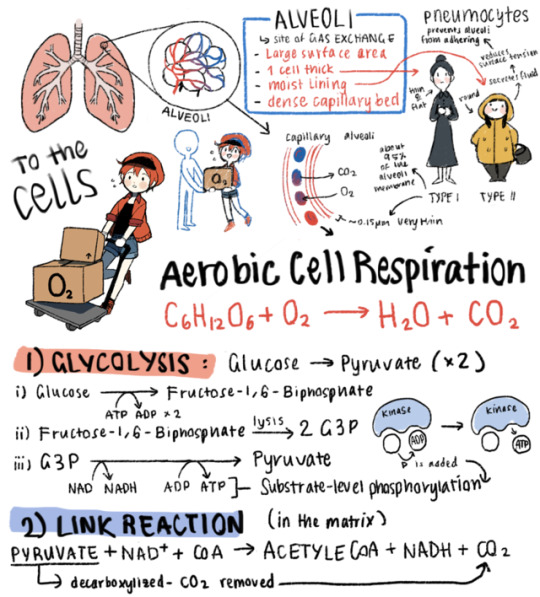Don't wanna be here? Send us removal request.
Text
So I’ve been in the room for prospective PhD student interviews three of the last four years, once as a prospective student and twice as a member of the interview committee. Here are some random pro-tips for anybody about to go through that process:
Test your Skype. Or whatever other program you’re using for the video interview if it isn’t happening in person. Seriously. There’s nothing worse than losing half your time to technical problems. Also, consider using headphones so the committee isn’t listening to themselves echo through your room from your computer speakers.
Re-read your writing sample/personal statement before the interview. They’re going to ask questions about both of those things. What I would really recommend is printing a hard copy and highlighting/taking notes in the margins so you have more to talk about regarding those documents when they inevitably ask.
Be prepared to talk about other work you’ve done. They want to hear something they haven’t already heard in addition to more about stuff you’ve already submitted. Be ready to talk about what you’re currently working on, what you’re working on next, and where you think your interests might lead you during your doctoral study.
Know why you’re a good fit for this department. It’s not enough to know why you want to go to grad school. You need to know why this particular program at this particular school with this particular faculty is right for you (and why you’re right for them).
Write down talking points and questions you have beforehand. Blanking on your research when asked a question eats up valuable time, and this may be one of the only opportunities you have to ask questions of faculty and current students that aren’t listed on the department website. It’s okay to say, “Let me think about that for a second,” and gather your thoughts before you decide how best to articulate an answer, but you don’t want to be reaching for the substance of it. Be ready to ask about anything important to your experience as a graduate student, whether it’s teaching opportunities or the possibility of interdisciplinary work.
Treat it like an interview, not a casual conversation. Save the chummy stuff for when you’ve actually gotten to know these people. Approach the interview like a job interview, because that’s what it is. Cut back on slang and casual constructions like, “So I was like,” and “You know?” because it makes you sound like a teenager, and you want the committee thinking about your ideas, not whether you know how to be professional.
Do not spend the entire interview playing with your hair, clothes, etc. It’s really distracting when an interviewee never stops moving, and the committee will end up remembering how you couldn’t stop touching your sweater and not what you were actually talking about. This seems minor, but it screams I’ve never done this before and I may not present well at conferences or other professional events. If you’re a nervous person or someone who tends to talk with a lot of gestures, do a mock interview with a friend so you can practice being still. Sit on your hands if you have to.
CLEAN YOUR GODDAMN ROOM. Look, admissions committees understand that a lot of students have limited living space and need to do their interviews in their bedroom or whatever. But for the sake of avoiding embarrassment and bad first impressions, take a test run and make sure your interviewers aren’t going to be distracted by piles of dirty clothes or empty packs of cigarettes or overflowing trash cans. Is that how you’re going to treat your communal office space if they make you an offer? Don’t make them wonder.
This stuff takes time and experience to learn, but the sooner you start paying attention to how you conduct yourself in a professional academic environment–even at a distance–the better your odds of getting a good offer are going to be. Don’t psych yourself out, practice if you need to, and give yourself the best chance you can.
621 notes
·
View notes
Text
real examples of job interview questions from my boss:
three years ago, when I interviewed for my current job, questions came from a long list that my boss had written himself. I found that list recently and trimmed it down to what I believe are the hardest/trickiest questions to answer so that maybe you guys can think on them and be prepared for your next job interview! best of luck!!

please describe for me a typical day on your past/current job
why did you leave your last job?
how do your previous work experiences prepare you for this position?
give me an example from your current/past job that demonstrates your persistence.
how do you organize yourself for day-to-day activities?
when you are assigned to work with new people, how do you go about getting to know them and how they work?
what type of person is the hardest for you to get along with?
how do you handle conflicts, like with a co-worker or boss? how do you resolve them?
how would you define a conductive work atmosphere?
what do you want out of a job?
what makes a job enjoyable for you?
what is your greatest strength? worst deficiency?
how do you take direction?
what do you do when things are slow at work?
what do you do when you’re having trouble solving a problem?
what kinds of decisions do you find particularly hard to make?
why is it important to prioritize?
why do you think you’ll be successful in this job?
what are your goals - both short term and long term?
how do you cope with the inevitable stresses and pressures of the job?
what kinds of things would you want to avoid in future jobs?
what reservations do you have about working here?
what ways do you find work interferes with your personal life?
define cooperation.
how can we best reward you for doing a good job?
14K notes
·
View notes
Photo


here are old studyblr photos that i’m slowly scraping out from the bottom of my photo library! i always seem to forget to post :(((((
5K notes
·
View notes
Photo





january weeklies! another late photoset, I’m sorry 😅 I tried out different layouts for each week; it was fun! my favorite’s the spread from week 3 (and it’s not about that yoongi photo in the corner, I swear 🤭)
749 notes
·
View notes
Photo



Yes I did spend my friday night by drawing brains
3K notes
·
View notes
Text


2 jan 2019
What a magical day 🔮
Take a break and appreciate the good moments of life
Because this is what we need.
651 notes
·
View notes
Photo

i was terrified of doing this in undergrad, and now that i’m asked to write them fairly often, i am fondly exasperated when my students don’t know how to ask for them. obviously there’s no single way, but here’s the way i usually do it.
THE FIRST EMAIL
should be short & should mainly be asking whether they’re willing to write you the letter
should provide only the basics - what the professor absolutely needs to know.
the position you’re applying for
when the letter would be due
optional: if you’re afraid they won’t remember you, a quick line identifying yourself & your relation to them
i like to provide an “out,” in case they don’t want to or are unable to write the letter
SAMPLE Dear Professor X, I’m applying for a job as an English tutor at the University Student Resource Center, and was wondering if you’d be willing to write me a letter of recommendation for the position. [optional identification: I really enjoyed taking English 300 with you in Winter 2016, and I’m hoping to develop and pass on those skills to other students through this job.] The letter would be due by September 1st - I know you’re very busy, so I completely understand if you’re not able to write one. All best, Your Name
THE SECOND EMAIL
they said yes!! amazing.
this one can provide a little more information – a link to the job posting, if there is one, or you can write a quick summary of the position, plus a sentence or two about why you’re excited/interested in the job.
also tell them where to send the letter!!
directly to the recruiter for the job
to you, to add to your application packet
upload to an online LoR service or to an application website
99% of the time folks are fine with receiving electronic copies, but if they need to mail a hard copy, let them know up front.
SAMPLE: Dear Professor X, Thank you so much! I really appreciate it. Here’s the link to the job listing; the letter should be sent as a .pdf file to the email address at the bottom of the page, anytime before 9/1. Thanks again – I’m hoping that this job will provide me with some teaching experience and the opportunity to work on my own writing. Please let me know if you need any more information! Best, Your Name
WHEN TO SEND A FOLLOW-UP
these stress me out real bad but here’s the deal: most professors have a very shaky relationship to deadlines (especially when they have half a dozen more important ones than your piddly LoR).
the upshot: do not be afraid to nudge them.
often they need the nudge and are appreciative of it.
when that nudge happens is up to you and how much room you’ve given them before the deadline, and it’ll look different depending on your relationship with that professor.
GRAD SCHOOL LETTERS
i offered to send my professors essays that i had written for their classes, especially if i had taken those classes more than a year before asking them to write the letter, just so they could refamiliarize themselves with my work. you can also offer to send them your writing sample, if you haven’t already asked them to look it over for you.
honestly i’d recommend asking for these in person bc it’ll give you a chance to talk to them about their grad school experience and your own hopes & aspirations, which will help them write a more personal, fleshed-out letter.
one important note: if this letter is intended for use in grad school applications, do not stress out if it’s a little late. most programs do not care, and pretty much all of them accept late letters without a problem. your professor’s ability to meet deadlines does not reflect on you, and professors are intimately familiar with running late on LoRs. they really honestly don’t care. as long as it gets there before too long, you’ll be fine.
thank-yous are up to you! keep in mind that many departments have policies about gift-giving. i did give thank-yous to my three major letter writers, but they were handwritten cards & homemade cookies, nothing store-bought or expensive.
9K notes
·
View notes
Text


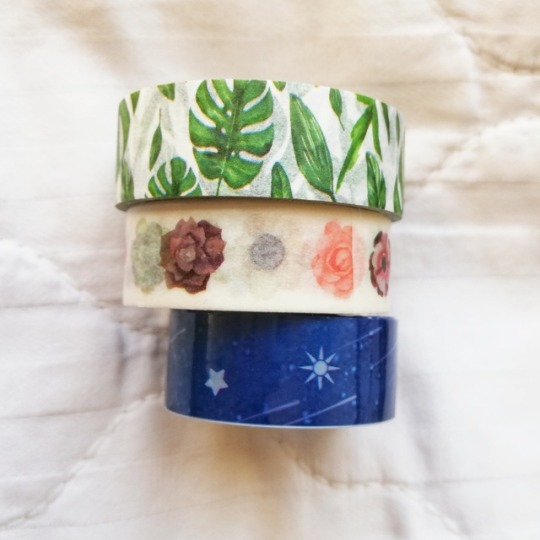
09.12.18 // lil aliexpress haul! not everything has arrived yet, but i’ll make another haul & review when i get the rest of the stuff. more under the cut.
white gel pen - i got this for lettering (you can see it here), and i think it works pretty well. sometimes the ink bunches up at the tip but no big deal.
muji-like pen - i am going to order more of this, it writes so well and i love the look!
0.38 gel pen - 6 pack ink refill (white and purple pen) - i love these pens, now i just re-order the inks which is great. these are super thin!
pluto memo pad - these were supposed to come with a paper back thing, and i am disappointed it didnt. the memos themselves are rather thin, but the designs are so pretty! not bad for the price, but the quality is lower.
petit prince & ancient poetry stickers - i love these sticker boxes. i can’t wait to incorporate them into my spreads
sumikko gurashi stickers - i love these but there is one downfall, it is so hard to get the plastic backing off of them.
plant washi - i wanted this for awhile, and boy do these look good!!! i love them so much! i would recommend you guys to buy, the only negative is the roll is around plastic instead or cardboard so its a bit thicker looking compared to my other washi.
succulent washi - i love this one! it looks so much nicer than it does in the packaging.
star tape - this was so cheap, it isnt washi though, just regular tape with stars on it. not bad considered it was like 12 cents.
if you want anything else next time i do a review (swatches or something), let me know!
49 notes
·
View notes
Text

A happy and positive moodboard for anon recovering from depression!!!
359 notes
·
View notes
Text
24 Invaluable Skills To Learn For Free Online This Year
Here’s an easy resolution: This stuff is all free as long as you have access to a computer, and the skills you learn will be invaluable in your career, and/or life in general.
1. Become awesome at Excel.
Chandoo is one of many gracious Excel experts who wants to share their knowledge with the world. Excel excellence is one of those skills that will improve your chances of getting a good job instantly, and it will continue to prove invaluable over the course of your career. What are you waiting for?
2. Learn how to code.
littleanimalgifs.tumblr.com
Perhaps no other skill you can learn for free online has as much potential to lead to a lucrative career. Want to build a site for your startup? Want to build the next big app? Want to get hired at a place like BuzzFeed? You should learn to code. There are a lot of places that offer free or cheap online coding tutorials, but I recommend Code Academy for their breadth and innovative program. If you want to try a more traditional route, Harvard offers its excellent Introduction to Computer Science course online for free.
3. Make a dynamic website.
You could use a pre-existing template or blogging service, or you could learn Ruby on Rails and probably change your life forever. Here’s an extremely helpful long list of free Ruby learning tools that includes everything from Rails for Zombies to Learn Ruby The Hard Way. Go! Ruby! Some basic programming experience, like one of the courses above, might be helpful (but not necessarily required if you’re patient with yourself).
4. Learn to make a mobile game.
If you’re not interested in coding anything other than fun game apps, you could trythis course from the University of Reading. It promises to teach you how to build a game in Java, even if you don’t have programming experience! If you want to make a truly great game, you might want to read/listen up on Game Theory first.
5. Start reading faster.
Spreeder is a free online program that will improve your reading skill and comprehension no matter how old you are. With enough practice, you could learn to double, triple, or even quadruple the speed at which you read passages currently, which is basically like adding years to your life.
6. Learn a language!
With Duolingo, you can learn Spanish, French, Portuguese, Italian, or English (from any of the above or more). There’s a mobile app and a website, and the extensive courses are completely free.
Full disclosure: BuzzFeed and other websites are in a partnership with DuoLingo, but they did not pay or ask for this placement.
7. Pickle your own vegetables.
Tired of your farmer’s market haul going bad before you use it all? Or do you just love tangy pickled veggies? You too can pickle like a pro thanks to SkillShare and Travis Grillo.
8. Improve your public speaking skills.
You can take the University of Washington’s Intro to Public Speaking for free online. Once you learn a few tricks of the trade, you’ll be able to go into situations like being asked to present at a company meeting or giving a presentation in class without nearly as much fear and loathing.
9. Get a basic handle of statistics.
UC Berkeley put a stats intro class on iTunes. Once you know how to understand the numbers yourself, you’ll never read a biased “news” article the same way again — 100% of authors of this post agree!
10. Understand basic psychology.
Knowing the basics of psych will bring context to your understanding of yourself, the dynamics of your family and friendships, what’s really going on with your coworkers, and the woes and wonders of society in general. Yale University has its Intro to Psychology lectures online for free.
11. Make your own music.
Step one: Learn how to play guitar: Justin Guitar is a fine and free place to start learning chords and the basic skills you’ll need to be able to play guitar — from there, it’s up to you, but once you know the basics, just looking up tabs for your favorite songs and learning them on your own is how many young guitar players get their start (plus it’s an excellent party trick).
Step two: A delightful free voice lesson from Berklee College Of Music.
Step three: Have you always thought you had an inner TSwift? Berklee College of Music offers an Introduction to Songwriting course completely for free online. The course is six weeks long, and by the end of the lesson you’ll have at least one completed song.
Step four: Lifehacker’s basics of music production will help you put it all together once you have the skills down! You’ll be recording your own music, ready to share with your valentine or the entire world, in no time!
12. Learn to negotiate.
Let Stanford’s Stan Christensen explain how to negotiate in business and your personal life, managing relationships for your personal gain and not letting yourself be steamrolled. There are a lot of football metaphors and it’s great.
13. Stop hating math.
If you struggled with math throughout school and now have trouble applying it in real-world situations when it crops up, try Saylor.org’s Real World Math course. It will reteach you basic math skills as they apply IRL. Very helpful!
14. Start drawing!
All kids draw — so why do we become so afraid of it as adults? Everyone should feel comfortable with a sketchbook and pencil, and sketching is a wonderful way to express your creativity. DrawSpace is a great place to start. (I also highly recommend the book Drawing on the Right Side of the Brain if you can drop a few dollars for a used copy.)
15. Make your own animated GIF.
BuzzFeed’s own Katie Notopoulos has a great, simple guide to making an animated GIF without Photoshop. This is all you need to be the king or queen of Tumblr or your favorite email chains.
16. Appreciate jazz.
reddit.com
Have you never really “gotten” jazz? If you want to be able to participate in conversations at fancy parties and/or just add some context to your appreciation of all music, try this free online course from UT Austin.
17. Write well.
Macalester College’s lecture series is excellent. If you’re more interested in journalism, try Wikiversity’s course selection.
18. Get better at using Photoshop.
Another invaluable skill that will get you places in your career, learning Photoshop can be as fun as watching the hilarious videos on You Suck At Photoshop or as serious as this extensive Udemy training course (focused on photo retouching).
19. Take decent pictures.
Lifehacker’s basics of photography might be a good place to start. Learn how your camera works, the basic of composition, and editing images in post-production. If you finish that and you’re not sure what to do next, here’s a short course on displaying and sharing your digital photographs.
20. Learn to knit.
Instructables has a great course by a woman who is herself an online-taught knitter. You’ll be making baby hats and cute scarves before this winter’s over!
21. Get started with investing in stocks.
If you are lucky enough to have a regular income, you should start learning about savings and investment now. Investopedia has a ton of online resources, including this free stocks basics course. Invest away!
22. Clean your house in a short amount of time.
Unf$#k Your Habitat has a great emergency cleaning guide for when your mother-in-law springs a surprise visit on you. While you’re over there, the entire blog is good for getting organized and clean in the long term, not just in “emergencies.” You’ll be happier for it.
23. Start practicing yoga.
Most cities have free community classes (try just searching Google or inquiring at your local yoga studio), or if you’re more comfortable trying yoga at home, YogaGlohas a great 15-day trial and Yome is a compendium of 100% free yoga videos. If you’re already familiar with basic yoga positions but you need an easy way to practice at home, I recommend YogaTailor’s free trial as well.
24. Tie your shoelaces more efficiently.
It’s simple and just imagine the minutes of your life you’ll save!
252K notes
·
View notes
Text
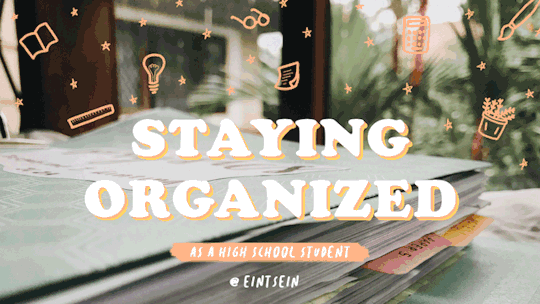
Hey guys, so I’m nearing the end of my senior year, and it’s been great so far! I accomplished my academic tasks efficiently and didn’t burn myself out, and I think the main contributor to my success as a student is my organization system. This system has been refined throughout my high school years, but I think now I’ve finally found the most effective methods.
Please remember that this isn’t the only organization system you can adopt; this is just the one that works the best for me, and I hope that by sharing it with you, you’ll gain a new perspective on how to stay organized as a high school student.

The first thing I wanna talk about is my notebook system, which I briefly mentioned in my Guide to Note-Taking.
My notebook system comprises three types of notebooks: the Everything Notebook, the subject notebook, and the revision notebook.
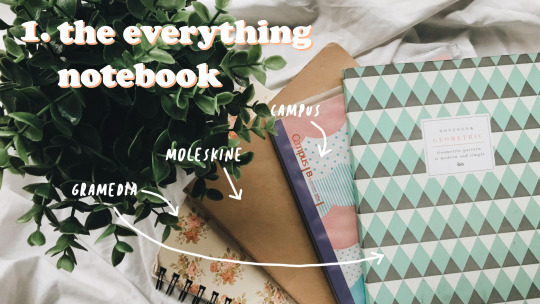
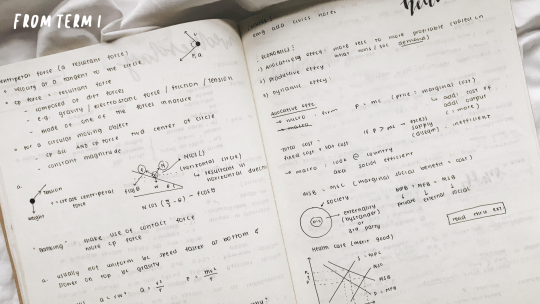
The Everything Notebook
The first stage is in-class notes. I only bring one notebook to school every day. I call it my Everything Notebook, and this is where I write down all of the notes I take in class. This way, I don’t have to lug around six notebooks where I’m only going to use a few pages in each of them that day.
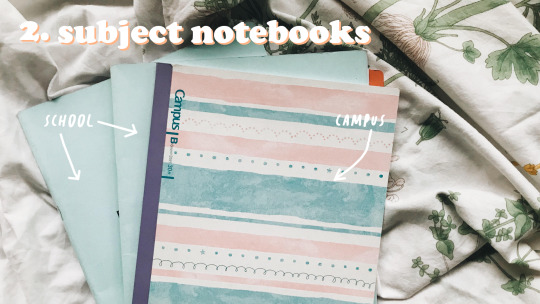
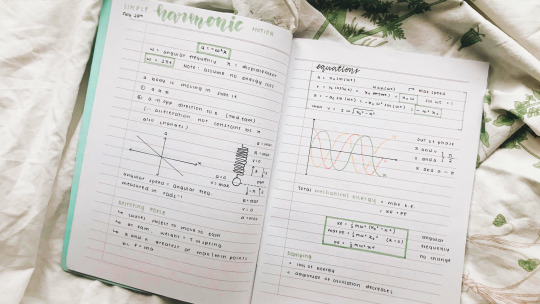
Subject Notebooks
At the end of the day, I would revise my notes and compare them to the syllabus so I know where we are in the learning process. I would then transfer my class notes from my Everything Notebook to my different subject notebooks. This is stage two. I also start to jazz up my notes because I use the notes in my subject notebooks to study for tests.
In addition to my class notes, I include material from my teachers’ notes that they might not have elaborated on, as well as points in the syllabus (I’m currently taking A2) that were only glazed over briefly, or not at all, in some cases. (Note: this does not mean they completely skip a chapter or topic; it’s more like they missed a few bullet points that should be in my notes but aren’t. An example would be if we’re learning about phenol reactions and the teacher forgot to mention the use of FeCl3 as a test for phenol.)
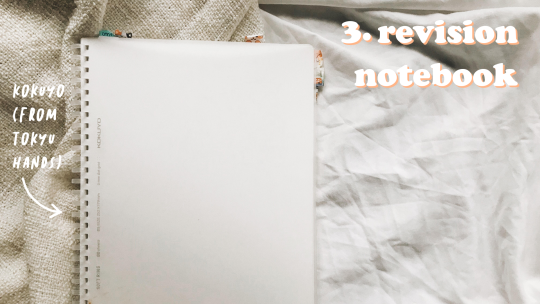
Revision Notebooks
Stage three comes a little later, when exam week is just around the corner. Essentially, I rewrite and improve my notes from my five different subject notebooks into a single revision notebook or binder. (Recently, I’ve opted for a revision notebook because they’re lighter and easier to carry around.)

Because my teachers don’t always teach in the order of the syllabus, the first thing I do is organize my notes according to the syllabus. I would then fill in any other missing gaps in the material that hadn’t been filled in stage two.
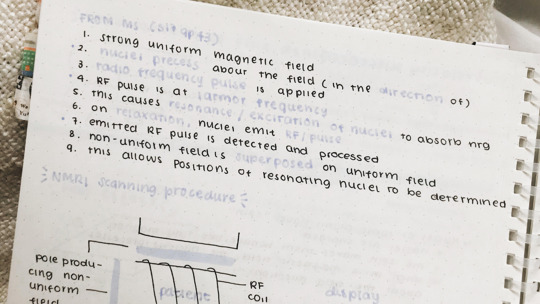
When compiling material for my revision notebook, I use as many sources as possible: my own notes, my teachers’ notes, youtube videos, online sites, and my favorite, the mark scheme! I add in some answers from past papers (explanations only, so no calculations) mainly to secure marks. It’s safer to memorize definitions straight from the mark scheme than from the textbook or from handouts. I also do this to ease my memorization, especially for topics that require lengthy explanations. It’s a lot easier to remember the 6 points I need to explain the principles of NMRI than to remember everything in the four-page handout my teacher gave me.

Folders and binders are essential to organizing your papers. Some people keep a single accordion folder for all their papers, but for me it’s just too heavy to carry around all the time. The same goes for subject folders that are brought to school every day.
Instead, my binder/folder system comprises my Everything Folder and my subject binders.
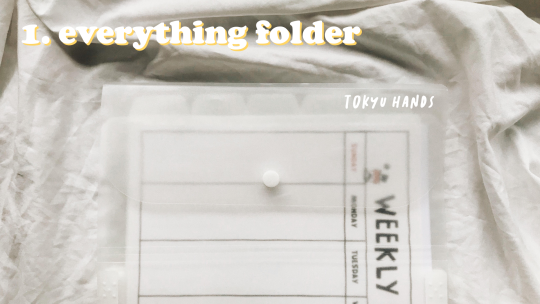
The Everything Folder
The folder I carry with me to school every day is this A4 folder I got from Tokyu Hands. It has 5 pockets, one for each day of the week, so all the papers I receive on Monday will go behind the first divider, and so on.
Some people also keep blank papers in their folders; I don’t because my school has its own lined paper and graphing pads that I keep under my desk that I use if a teacher asks us to do an assignment on those papers. If I do work at home, I prefer to just use a plain A4 paper or a legal pad.

Subject Binders
At the end of the week, I’ll sort my papers into my subject binders. Sometimes I’ll keep some papers in the folder if I think I’ll be needing it the next week. This usually only applies to worksheets because all my teachers’ notes are available on Google Classroom, so I can access them even if I don’t physically have them.
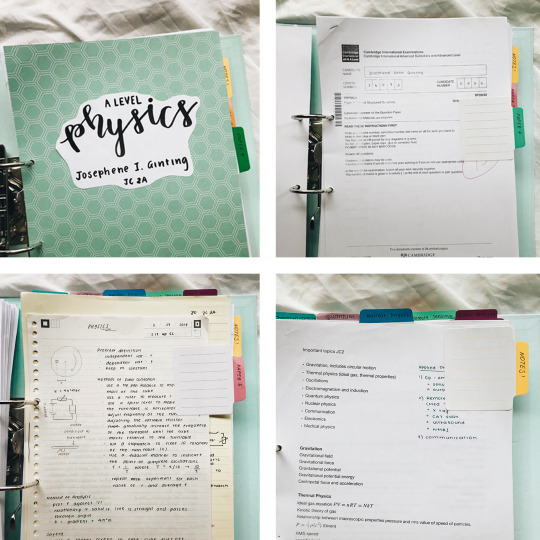
Each of these binders have sections inside them:
Physics: 1 for handouts, notes, and tests, 1 for Paper 4 (Theory), 1 for Paper 5 (Practical Planning). I included extra tabs to mark the different topics in the handouts section.
Chemistry: same as Physics.
Economics: 1 for Paper 3 (MCQ), 1 for Paper 4 (Case Study and Essay). A lot of my Economics material is online, though.
English: 1 for Paper 3 (Text and Discourse analysis), and 2 for Paper 4 (Language Topics, which includes 1 for Child Language Acquisition, 1 for World Englishes). Past papers, handouts, and notes all go under their respective topics.
Mathematics: I just keep everything together because I never revise math and just constantly do past papers.
This makes it easier for me to revise each subject because I can just take one binder with me instead of a messy folder with everything just shoved in there.

I keep a magazine file for each of my A-Level subjects (English and Mathematics are combined). All my textbooks, revision guides, and subject notebooks are kept here, so if I need to revise one subject, that’s the magazine file I’ll take out.
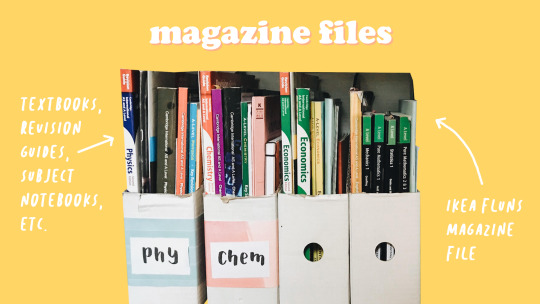
These magazine files prevent any small things (like my book of flashcards) from being shoved to the back of my bookshelf, or materials from different subjects from getting mixed up.

In my senior year, I mostly plan using this app called Edo Agenda. It syncs across all my devices for free and has all the features I need: a to do list to organize tasks, monthly and weekly calendars to organize events, a journal to organize notes and memos.
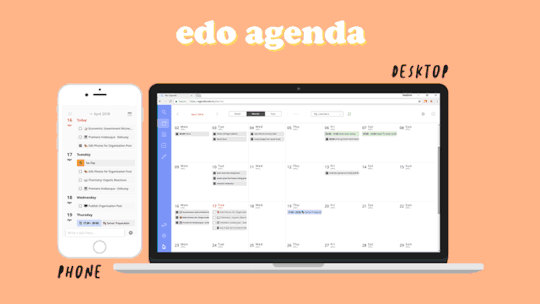
I used to bullet journal regularly, but it takes too much time during weekdays, so now I just bullet journal for the therapeutic effects it gives me, and I use an app for organizing tasks and events. Sometimes at the end of each week, I’ll transfer my tasks to my bullet journal and then decorate the page, but again, this is just for its therapy.

Organizing your school supplies is just as important as organizing your papers and notes. With a more organized backpack and pencil case, you won’t waste time looking for your things at the bottom of an abyss.
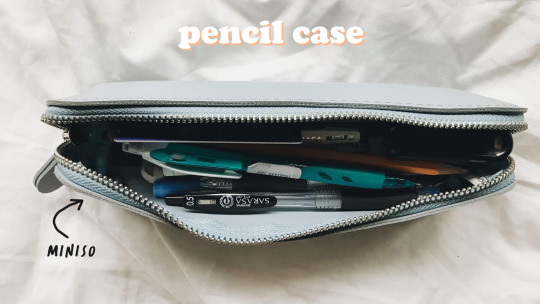
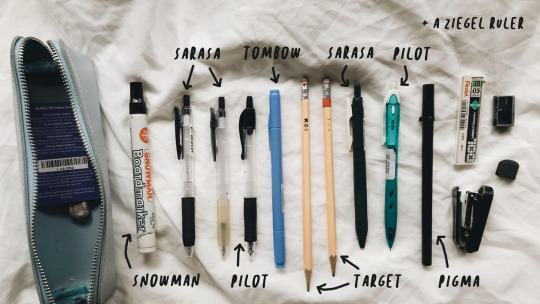
Pencil Case
I don’t find it necessary to bring so much stationery to school unless I plan on making notes at school (usually during revision week).
Backpack
Because we’re already in the revision term, I don’t really carry a lot of things in my everyday backpack, just the following:
Pencil case
Everything Notebook
Everything Folder
Revision notebook
Kindle
Phone
Wallet
Earphones
Calculator
Speaker
Drinking bottle
A pouch with things like a hairbrush, pads, and lip balm
And that’s all for now! I hope this post will help you organize your school life (if you haven’t already) or at least provide some useful insights on some ways to stay organized as a high school student.
45K notes
·
View notes
Photo








“A few months ago I didn’t even know if I was gonna be here. Up until a month ago, all of this was still unknown. That’s why I think I was able to just feel and be… These are my last nationals, this is the last time I’m out there for a short program… This is all emotional for me, this is all very meaningful.”
Returning from a concussion, Elladj Baldé performs his short program to The Sound of Silence at the 2018 Canadian National Championships, scoring 84.91 points for 4th place.
528 notes
·
View notes
Text
99 legal sites to download literature
The Classics
Browse works by Mark Twain, Joseph Conrad and other famous authors here.
Classic Bookshelf: This site has put classic novels online, from Charles Dickens to Charlotte Bronte.
The Online Books Page: The University of Pennsylvania hosts this book search and database.
Project Gutenberg: This famous site has over 27,000 free books online.
Page by Page Books: Find books by Sir Arthur Conan Doyle and H.G. Wells, as well as speeches from George W. Bush on this site.
Classic Book Library: Genres here include historical fiction, history, science fiction, mystery, romance and children’s literature, but they’re all classics.
Classic Reader: Here you can read Shakespeare, young adult fiction and more.
Read Print: From George Orwell to Alexandre Dumas to George Eliot to Charles Darwin, this online library is stocked with the best classics.
Planet eBook: Download free classic literature titles here, from Dostoevsky to D.H. Lawrence to Joseph Conrad.
The Spectator Project: Montclair State University’s project features full-text, online versions of The Spectator and The Tatler.
Bibliomania: This site has more than 2,000 classic texts, plus study guides and reference books.
Online Library of Literature: Find full and unabridged texts of classic literature, including the Bronte sisters, Mark Twain and more.
Bartleby: Bartleby has much more than just the classics, but its collection of anthologies and other important novels made it famous.
Fiction.us: Fiction.us has a huge selection of novels, including works by Lewis Carroll, Willa Cather, Sherwood Anderson, Flaubert, George Eliot, F. Scott Fitzgerald and others.
Free Classic Literature: Find British authors like Shakespeare and Sir Arthur Conan Doyle, plus other authors like Jules Verne, Mark Twain, and more.
Textbooks
If you don’t absolutely need to pay for your textbooks, save yourself a few hundred dollars by reviewing these sites.
Textbook Revolution: Find biology, business, engineering, mathematics and world history textbooks here.
Wikibooks: From cookbooks to the computing department, find instructional and educational materials here.
KnowThis Free Online Textbooks: Get directed to stats textbooks and more.
Online Medical Textbooks: Find books about plastic surgery, anatomy and more here.
Online Science and Math Textbooks: Access biochemistry, chemistry, aeronautics, medical manuals and other textbooks here.
MIT Open Courseware Supplemental Resources: Find free videos, textbooks and more on the subjects of mechanical engineering, mathematics, chemistry and more.
Flat World Knowledge: This innovative site has created an open college textbooks platform that will launch in January 2009.
Free Business Textbooks: Find free books to go along with accounting, economics and other business classes.
Light and Matter: Here you can access open source physics textbooks.
eMedicine: This project from WebMD is continuously updated and has articles and references on surgery, pediatrics and more.
Keep reading
111K notes
·
View notes
Photo

This is a really helpful page in my CBT textbook for tackling some of the maladaptive beliefs we often hold. The first column lists the rules and assumptions we often may tell ourselves, while the second column is a more functional belief. Just thought I would pass this along. Be kind to yourselves, friends❤
68K notes
·
View notes
Photo
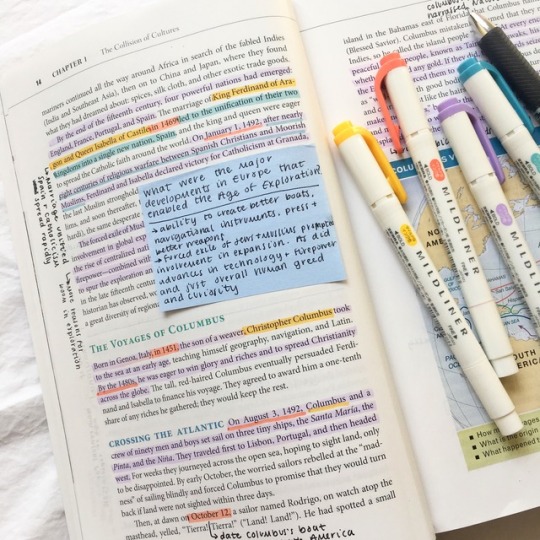
sept 4th, 2017
apush is HARD wow
—> studygram!
8K notes
·
View notes
